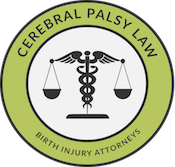Cerebral Palsy Attorneys in Lansing, Michigan
When a loved one is diagnosed with cerebral palsy or another birth injury, families have to meet costly medical bills, plan for time-consuming rehabilitation procedures, and handle considerable emotional burdens. The Lansing cerebral palsy lawyers from our birth injury law firm urge those affected by birth injury and cerebral palsy to learn as much as possible about the condition—how it’s caused, what cerebral palsy treatment options are available, and how to utilize the many wonderful disability resources offered at the federal, state, and local levels.
Before confronting anything else, we encourage families to thoroughly understand what cerebral palsy is. Cerebral palsy, often abbreviated to CP, refers to a grouping of neurological disorders affecting movement, cognition, learning, and the senses. Typical CP patients experience trouble with coordination, muscle tone, posture, control, balance, reflexes, and gait. While there are no definitive treatments for these complications, a number of therapies, lifestyle changes, and medical procedures can help restore physical, mental, emotional, and social well-being to the lives of individuals with cerebral palsy.
Because the complications associated with cerebral palsy are so extreme, it is unfortunate that they are often the result of avoidable medical errors. We encourage the Lansing families affected by medical malpractice to reach out to our Lansing cerebral palsy lawyers for legal help—we have specific and extensive experience in birth injury cases around Michigan and will fight to obtain the compensation your family deserves. Contact our Lansing cerebral palsy lawyers in any of the following ways for a free case review. The Lansing cerebral palsy lawyers at Michigan Cerebral Palsy Attorneys are available to answer your legal questions 24/7.
Complete this online contact form
Call our offices toll-free at (888) 592-1857
Press the Live Chat tab to the left to speak with a representative
Birth Injury in Lansing: What Causes Cerebral Palsy?
Our Lansing Cerebral Palsy Lawyers Discuss Medical Malpractice and Birth Injury
 In this section, we’ll walk you through some of the most common ways infants and children develop cerebral palsy. Additionally, we will briefly discuss how medical error, misdiagnosis, and the mismanagement of pregnancy complications can lead to brain damage, cerebral palsy, and developmental disabilities. If you have any questions, please reach out to our Lansing cerebral palsy lawyers.
In this section, we’ll walk you through some of the most common ways infants and children develop cerebral palsy. Additionally, we will briefly discuss how medical error, misdiagnosis, and the mismanagement of pregnancy complications can lead to brain damage, cerebral palsy, and developmental disabilities. If you have any questions, please reach out to our Lansing cerebral palsy lawyers.
- Hypoxic ischemic encephalopathy (HIE): HIE, also known as birth asphyxia, is a type of brain injury that occurs when a baby fails to receive enough oxygen around the time of delivery. As one of the most common precursors to infant brain damage, cerebral palsy, and seizures, HIE can result from a number of medical errors. Nearly every one of the causes and complications discussed in this section, when not handled properly, can cause hypoxic ischemic encephalopathy.
- Early or late deliveries are often accompanied by complications that lead to cerebral palsy. In preterm deliveries, infants’ underdeveloped organs and cannot handle the extreme stresses of delivery. In cases of post-term delivery, fetuses are often too large to easily pass through the mother’s pelvic area—larger than average babies are considered macrosomic, and macrosomic babies suffer trauma from cephalopelvic disproportion (CPD) when they cannot easily pass through the mother’s pelvic region. Additionally, the placenta begins to lose powerful nutrients after 37 weeks of pregnancy, ultimately diminishing supplies of oxygenated blood to the baby and causing HIE, brain damage, cerebral palsy, and associated complications.
- Undiagnosed or untreated medical issues in both the mother and fetus can cause lifelong brain damage, cerebral palsy, and disabilities in the child. Medical complications in the mother include preeclampsia (pregnancy-induced high blood pressure), gestational diabetes, chorioamnionitis, vaginal birth after delivery (VBAC), bacterial vaginosis, urinary tract infections, Group B Strep (GBS), villitis, and oligohydramnios. Some examples of fetal health issues include jaundice and kernicterus, neonatal sepsis and meningitis, and fetal stroke.
- Delayed C-Section: Failure on the part of medical professionals to swiftly order a C-section during strained, prolonged, or complicated pregnancies is a common cause of cerebral palsy, fetal death, HIE, seizures, brain damage, and disability.
- Umbilical cord issues, including nuchal cords (when the cord wraps around the baby’s neck), compressed cords (often due to hyperstimulation), and prolapsed cords (when the cord enters the birth canal before the baby) can limit passage of oxygenated blood to the baby’s brain and result in HIE, brain damage, and cerebral palsy.
- Intracranial hemorrhages, or brain bleeds, occur when an infant experiences excessive cranial pressure during labor and delivery. Brain bleeds are caused by traumatic birth, the incorrect use of vacuum extractors and forceps and prolonged labor and hyperstimulation from size abnormalities or labor induction drugs.
- Periventricular leukomalacia (PVL), an injury associated with labor and delivery, occurs when a lack of blood flow and oxygen to a baby’s brain softens brain tissue and destroys the brain’s white matter. The white matter transmits impulses and information between the body and brain, and damage to white matter regions results in spasticity and intellectual impairments. The following conditions are known to cause PVL:
- Premature birth: Premature babies are at the highest risk for developing PVL, so medical professionals are responsible for preventing or delaying premature birth to minimize the risk. Overventilation in premature infants also increases the risk for developing periventricular leukomalacia.
- Untreated hypotension: Low blood pressure in the mother causes PVL.
- Hypoxemia: Insufficient oxygen levels in the blood can lead to PVL.
- Infections in the mother or baby increase a baby’s risk for brain damage and periventricular leukomalacia.
- Acidosis: Prolonged periods without oxygen result in high acidity in a baby’s blood, which leads to PVL in some cases.
- Hypocarbia: PVL may occur from diminished carbon dioxide levels in the blood.
If you or your loved one suffered one of the aforementioned complications, reach out to our Lansing cerebral palsy lawyers today—we will provide you with a free case review and inform you of your legal options. Contacting our Lansing cerebral palsy lawyers may be the first step toward a better life your family.
Legal Help for Cerebral Palsy and Birth Injury in Lansing, Michigan
Lansing Cerebral Palsy Lawyers Making a Difference
Whether your loved one’s cerebral palsy was the result of one of the conditions we discussed on this page or another labor and delivery complication, one of our Lansing cerebral palsy lawyers can help you find the compensation your family deserves. Call our Lansing cerebral palsy lawyers today at (888) 592-1857 and our birth injury attorneys will evaluate your case for free. Should we take your case, our no-fee policy ensures you will not be charged until our Lansing cerebral palsy lawyers win or settle in your favor.
To learn more about the many medical and lifestyle resources available to individuals with cerebral palsy in Lansing, please visit our Lansing Cerebral Palsy Resources page.
